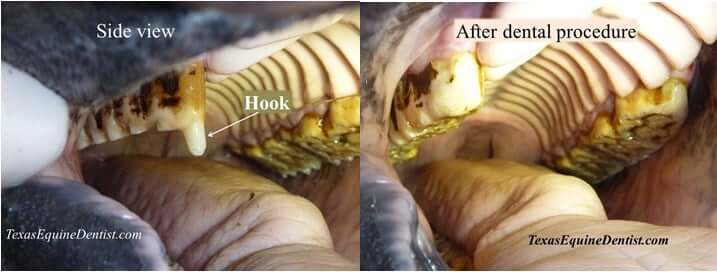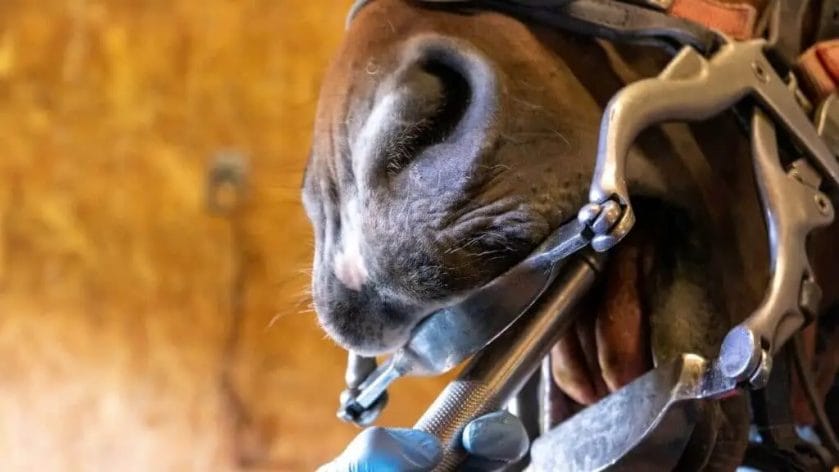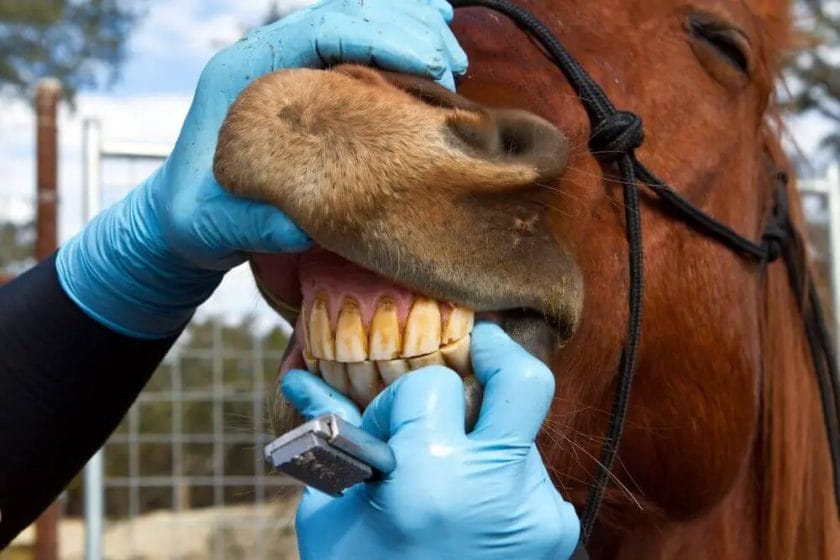Horses need their teeth floated regularly to maintain their dental health and overall well-being. Floating, which involves smoothing out the sharp points on their teeth, should be done every 6 to 12 months to prevent issues like discomfort, difficulty chewing, and weight loss. Regular dental care is crucial for horses, as it ensures proper digestion, adequate nutrient intake, and a comfortable mouth for wearing a bit and responding to the rider’s cues.

Signs and Symptoms of Dental Issues in Horses
Regular dental care is crucial for the overall health and well-being of horses. Dental issues can cause discomfort, pain, and even affect the horse’s ability to eat properly. As a responsible horse owner, it is essential to be aware of the signs and symptoms of dental problems in horses so that prompt veterinary care can be sought.
1. Difficulty Eating
Horses with dental issues may experience difficulty eating. They may drop food while chewing, tilt their head to one side, or avoid certain types of food altogether. Reduced appetite or weight loss can also be indicative of dental problems.
2. Excessive Drooling
If you notice your horse drooling excessively, it could be a sign of dental issues. Pain or discomfort in the mouth can cause increased salivation, leading to excessive drooling.
3. Bad Breath
A foul odor coming from your horse’s mouth can be an indication of dental problems. It could be caused by decayed or infected teeth, gum disease, or the presence of food particles trapped between teeth.
4. Head Tossing or Shaking
Horses with dental issues may exhibit head tossing or shaking during riding or while being ridden. This behavior can be a result of pain or discomfort caused by the movement of the bit against sensitive areas in the mouth.
5. Facial Swelling or Discharge
Swelling on the face, especially around the jaw or cheek area, can be a sign of dental problems. Additionally, if you notice any abnormal discharge from the horse’s nose or mouth, it could indicate an infection or abscess.
6. Behavioral Changes
Dental issues can cause significant discomfort, leading to changes in behavior. Horses may become irritable, resistant to being bridled, or display signs of discomfort when the bit is inserted.
7. Weight Loss or Poor Body Condition
If a horse is experiencing dental issues and is unable to chew food properly, it may result in weight loss or poor body condition. The horse may not be getting the nutrients it needs, leading to a decline in overall health.
8. Mouth Odor or Sensitivity
A horse with dental problems may show signs of mouth odor or sensitivity. They may react when touched around the mouth area or show signs of pain when eating or drinking.
9. Uneven or Broken Teeth
Inspecting the horse’s teeth can often reveal signs of dental issues. Look for any broken, missing, or uneven teeth, as these can contribute to discomfort and difficulty in chewing.
10. Quidding
Quidding refers to the behavior where a horse drops partially chewed food from their mouth while eating. It can be a result of dental problems such as sharp points or malocclusions, which hinder proper chewing.
In summary, being vigilant about your horse’s dental health is crucial. Regular dental check-ups and routine floating (smoothing the teeth) by a qualified equine dentist or veterinarian can help prevent and address dental issues. If you notice any signs or symptoms of dental problems in your horse, it is important to seek veterinary care promptly to ensure your horse’s well-being.

Frequency of Teeth Floating for Optimal Equine Dental Health
Proper dental care is essential for maintaining the overall health and well-being of horses. One crucial aspect of equine dental care is teeth floating, which involves filing or rasping down the sharp edges and points on a horse’s teeth. This process helps ensure proper chewing, comfortable eating, and efficient digestion.
But how often should teeth floating be performed to achieve optimal equine dental health? Let’s explore the recommended frequency and factors to consider when scheduling this vital procedure.
1. Age of the Horse
The age of the horse plays a significant role in determining the frequency of teeth floating. Young horses, especially those under the age of five, experience rapid dental growth and often require more frequent floating. Their teeth may develop sharp points and edges more quickly, which can lead to discomfort and improper chewing.
As horses age, their dental rate of growth slows down, and the need for teeth floating becomes less frequent. However, some older horses may still require regular dental maintenance due to specific dental issues or malocclusions.
2. Dental Examination
Regular dental examinations by a qualified equine dentist or veterinarian are crucial for identifying dental issues and determining the need for teeth floating. During these examinations, the dental professional will assess the horse’s oral health, check for abnormalities, and evaluate the development of sharp edges or hooks on the teeth.
Based on their findings, the dental professional can recommend the appropriate frequency for teeth floating. This can vary depending on the individual horse’s dental condition and any underlying dental problems that may require more frequent attention.
3. Performance and Feeding Habits
The horse’s performance level and feeding habits can also influence the frequency of teeth floating. Horses involved in strenuous activities, such as racing or competitive jumping, may require more frequent dental maintenance due to the increased wear on their teeth.
Additionally, horses with specific feeding habits, such as those who consume a diet primarily composed of roughage or grazing on abrasive surfaces, may develop dental issues more quickly. Regular dental check-ups and floating may be necessary to address these concerns and ensure optimal dental health.
4. Individual Factors
Each horse is unique, and certain individual factors may influence the frequency of teeth floating. Some horses naturally have teeth that grow more quickly or unevenly, requiring more frequent maintenance. Other horses may have specific dental conditions or malocclusions that necessitate regular floating.
It is essential to work closely with a knowledgeable equine dental professional who can assess these individual factors and provide personalized recommendations for teeth floating frequency.
5. General Recommendation
While the frequency of teeth floating can vary based on the factors mentioned above, a general recommendation is to have a dental examination and floating performed at least once a year for most horses. This annual check-up allows for the early detection of any dental problems and ensures timely intervention.
However, it is crucial to follow the advice of the dental professional who evaluates your horse’s oral health. They may recommend more frequent floating if necessary to address specific issues and maintain optimal dental health.
Summary
Regular teeth floating is necessary for maintaining optimal equine dental health. The recommended frequency varies based on factors such as the horse’s age, dental examination findings, performance level, feeding habits, and individual factors. A general recommendation is to have a dental examination and floating performed at least once a year, but it is crucial to follow the advice of a qualified equine dental professional for personalized recommendations.

Factors Affecting the Time Between Dental Check-ups for Horses
Regular dental check-ups are important for maintaining the oral health of horses. The time between these check-ups can vary depending on several factors that influence the dental condition of the horse. By understanding these factors, horse owners and caretakers can ensure that their equine companions receive the appropriate dental care at the right intervals.
Diet and Forage Quality
The diet of a horse plays a significant role in determining the frequency of dental check-ups. Horses that primarily consume forage, such as grass and hay, require more frequent dental examinations compared to those on a diet consisting mainly of concentrates. This is because the fibrous nature of forage helps to naturally wear down the horse’s teeth, reducing the risk of dental issues. In contrast, concentrated feeds may not provide the same abrasive effect, leading to a faster buildup of dental problems.
The quality of the forage also affects the time between dental check-ups. Horses that graze on lush, high-quality pasture may have a lower risk of dental issues compared to those fed on poor-quality or over-mature forage. High-quality forage promotes better chewing efficiency and helps maintain healthy tooth wear, potentially extending the time between dental examinations.
Age and Dental Development
The age of the horse is another important factor to consider when determining the frequency of dental check-ups. Young horses, particularly during their first few years, undergo significant dental development. Their baby teeth (deciduous teeth) are gradually replaced by permanent teeth, which can cause discomfort and require monitoring by a veterinarian or equine dentist.
Additionally, senior horses may require more frequent dental examinations due to age-related dental issues such as tooth loss, gum disease, and changes in chewing efficiency. Regular check-ups allow for early detection and management of these age-related dental conditions.
Previous Dental History
The dental history of the horse is also an essential consideration. If the horse has previously had dental problems or required dental procedures, more frequent check-ups may be necessary to monitor their dental health and intervene promptly if any issues arise. This is especially true for horses with a history of dental abnormalities, such as sharp points, retained deciduous teeth, or malocclusions.
Behavioral Signs
Observing the behavior of the horse can provide valuable insights into their dental health and the need for check-ups. Certain behavioral signs may indicate dental issues, such as difficulty chewing, dropping feed, excessive salivation, head shaking, or resistance to the bit. If any of these signs are present, it is important to schedule a dental examination promptly, regardless of the time since the last check-up.
Summary
The time between dental check-ups for horses can vary depending on several factors. Diet and forage quality, age, previous dental history, and behavioral signs all play a role in determining the frequency of these examinations. By considering these factors and working closely with a veterinarian or equine dentist, horse owners can ensure that their horses receive proper dental care and maintain optimal oral health.
Professional Teeth Floating vs. DIY Techniques for Horses
Keeping a horse’s teeth in good condition is crucial for their overall health and well-being. One common dental procedure for horses is teeth floating, which involves smoothing out any sharp points or irregularities on the teeth’s surface. This helps ensure proper chewing and prevents discomfort or pain during eating.
When it comes to teeth floating, horse owners often have two options: hiring a professional equine dentist or attempting to do it themselves using various DIY techniques. Each method has its pros and cons, and it’s essential to understand them before making a decision.
Professional Teeth Floating
Professional teeth floating involves hiring a qualified equine dentist who has the necessary skills, knowledge, and specialized tools to perform the procedure correctly. Here are some advantages of choosing professional teeth floating:
- Expertise: Equine dentists undergo extensive training to learn about horse dental anatomy, oral health issues, and proper teeth floating techniques. They have a deep understanding of the complex structures in a horse’s mouth and can identify any underlying dental problems that need attention.
- Safety: Professionals have experience handling horses during dental procedures, ensuring both the horse and the dentist’s safety. They know how to properly sedate or restrain the horse to minimize stress and discomfort.
- Quality and Precision: Equine dentists use specialized tools that allow them to perform precise and thorough teeth floating. They can identify and address specific dental issues, such as sharp points, hooks, or abnormal wear patterns.
DIY Techniques
Some horse owners opt for DIY teeth floating techniques to save money or because they enjoy being hands-on with their horse’s care. However, it’s crucial to consider the following factors before attempting DIY teeth floating:
- Lack of Expertise: Unless a horse owner has received proper training in equine dentistry, they may lack the knowledge and skills required to perform teeth floating correctly. This can lead to potential mistakes or incomplete treatment, which may cause further dental issues.
- Safety Concerns: Working inside a horse’s mouth can be dangerous, especially without proper training and experience. Horses can react unpredictably to discomfort or pain, increasing the risk of injury for both the horse and the person attempting the DIY procedure.
- Accuracy: DIY techniques often involve using manual rasps or tools that may not provide the same level of precision as professional dental equipment. This can result in inadequate teeth floating, leaving sharp points or other dental problems unresolved.
In summary, when it comes to teeth floating for horses, hiring a professional equine dentist is generally the recommended approach. Their expertise, specialized tools, and ability to identify and address specific dental issues ensure the best possible outcome for the horse’s dental health. DIY techniques may be tempting, but without the necessary skills and knowledge, they can potentially do more harm than good. It’s always best to prioritize the horse’s well-being and entrust their dental care to a professional.
FAQs
Q: How often do horses need their teeth floated?
Horses generally need their teeth floated, or filed down, every 6 to 12 months. However, the frequency can vary depending on the individual horse’s dental health, age, and eating habits. Regular dental check-ups by a veterinarian can help determine the appropriate interval for floating.
Conclusion:
In conclusion, proper dental care is essential for the well-being of horses. Regular teeth floating is crucial to maintaining their oral health. By floating the teeth every 6 to 12 months, horse owners can prevent various dental issues such as sharp points, hooks, and uneven wear. Regular dental check-ups and floating will ensure that horses can chew their food properly, improving digestion and overall health.
Horse owners should consult with a qualified equine dentist or veterinarian to determine the specific needs of their horses. Regular dental maintenance will not only enhance the comfort and performance of horses but also prevent potential problems that could arise from neglected teeth.
Take the necessary steps to prioritize your horse’s dental care, and you will be rewarded with a happy and healthy equine companion.
